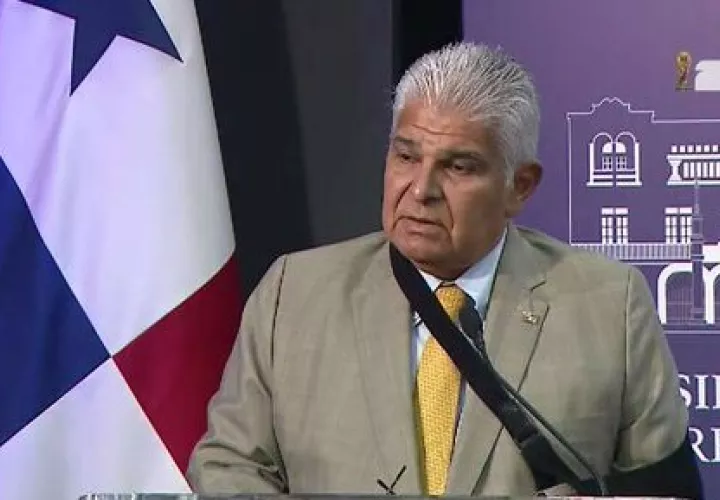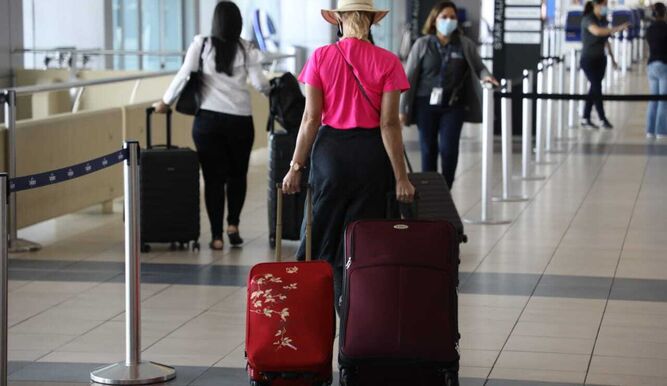Panama President Mulino: The Diplomatic Village is going to be Built But it won’t be for Parties
President Mulino at the weekly conference pictured below. Mulino describes the meeting with Donald Trump as “cordial.”

President José Raúl Mulino confirmed Thursday that the remodeling of the Diplomatic Villa will indeed take place, and clarified that it will not be a space for inappropriate social activities, but rather a place of official protocol. “The Diplomatic Villa will be built. It will be a protocol house, like those that exist in many parts of the world. It’s a place belonging to the State, to the Presidency of the country, where leaders and representatives of international organizations can be accommodated; they are provided with a room, car, and food, and high-level meetings can be held,” the president stated. In response to neighborhood concerns about the use of the space, the president was emphatic: “The only thing I can say to the residents is to stay calm. This won’t be a place for carousing, parties, or orgies,” he stated. The president also noted that he has no personal connection to the site, but acknowledged its historical significance:
“The Diplomatic Village, which I don’t know—I’ve never been there—is a historical monument because of what happened there. Commanders of the Southern Command lived there during the former Canal Zone, and many US military personnel were accredited and resided there.” He also explained that the project has already been awarded a tender and that work is being done in coordination with an architect to develop it. Regarding infrastructure, the president mentioned the possibility of modifying some elements, such as a tennis court, if they generate controversy among residents. “If someone is bothered by the tennis court, they can stop playing it. I don’t play tennis. I played, but I don’t think I can do it again, and it’s not what I’m interested in. I don’t have time for it,” he concluded.
Panama Will Train Haitian Police, But Will Not Send Troops
The head of the Executive branch assured that Panama will provide support to Haiti by training its police forces, but he categorically ruled out sending Panamanian troops to Haitian territory. In statements to the media, Mulino expressed concern about the dire security and governance situation in Haiti. “Haiti, unfortunately, is currently a failed country. There is no law there to guarantee anything,” the president stated. He reiterated that Panama is willing to cooperate with the international community by offering training to Haitian police officers within Panamanian territory. “I have proposed—and I told the Secretary-General of the United Nations—that Panama will cooperate on the issue of Haiti, providing training to its police forces in Panama. They can come to Panama… but we are not going to send soldiers to Haiti to die,” Mulino stated. These statements come amid growing international calls to strengthen security in Haiti, a country facing a profound political and social crisis, dominated by violence from armed groups and the absence of effective state authority.
Mulino Calls Precautionary Measures in High-Profile Cases a “Mockery of Justice.”
President José Raúl Mulino, as a lawyer, expressed his concern this Thursday about the way the Panamanian judicial system handles high-profile cases, asserting that some judicial decisions represent a “mockery of justice” and generate a growing sense of powerlessness among citizens. During a press conference, the president criticized the fact that people linked to serious crimes and embezzlement face only precautionary measures such as periodic signatures, despite the amounts and seriousness of the cases.
“I’m deeply concerned about high-profile cases. Emblematic cases are being filed, involving people who owe large sums of money to embezzlement, and the same thing happens with those arrested for heinous crimes,” Mulino said. “I spoke with the prosecutor, and it’s a mockery of justice.” Mulino directly questioned the role of some judicial judges, accusing them of acting as if they were “operating from another country” due to their apparent disconnect with the national reality and the nature of the crimes.
“The Public Prosecutor’s Office is no longer the same as it once was, omnipotent and omnipresent, kicking down a door, entering, opening it, and taking people away. With the Accusatory Criminal Justice System, that changes; every action must be authorized by competent judges, and in most cases, it seems as if those judges are operating from another country,” he stated. The president also alluded to cases in which millions of dollars have been found linked to possible acts of corruption, questioning the proportionality of judicial decisions: “It’s very delicate to see people linked to atrocious crimes, where an individual, personally, is found to have misappropriated $60 million… This is a mockery of Panamanian justice.”
Questions Proposed Reform to the Penal Code
Mulino also referred to the bill presented by Attorney General Luis Carlos Gómez, which proposes reforms to the Penal Code and the Code of Criminal Procedure. While acknowledging the need to improve procedural timelines, he warned of the risk of granting too much power to prosecutors. “I believe—and I’ve even spoken with the attorney general—that law should be withdrawn and better rethought. Personally, I’m concerned that, under the pretext of delivering justice more quickly, we’ll be left in the hands of prosecutors who can—I’m not saying it’s happening—become remotely controlled to follow orders, not conduct investigations,” he warned. The president’s statements reflect a sustained critical stance toward the functioning of the judicial system and could mark a new chapter in the debate over efficiency, independence, and balance of powers in Panama.
Mulino Describes the Meeting with Donald Trump as “Cordial”
Panamanian President José Raúl Mulino praised his participation in the reception hosted by U.S. President Donald Trump for heads of state and government at the United Nations General Assembly. “The meeting was very cordial. I am very satisfied with the relationship; we encourage each other to continue working together on the issues at hand,” Mulino said, referring to the diplomatic event, where he had a brief exchange with President Trump. “I was certainly surprised because I had never discussed it before, and it definitely distinguishes Panama as a cooperative country,” the Panamanian president said, highlighting the friendly tone of the approach.
Mulino also alluded to the complex international situation currently facing the Trump administration and emphasized that, for now, Panama is not at the center of that agenda. “President Trump’s agenda is a complicated one right now, and Panama, thank God, is not on it,” he said. Mulino also announced that his government is evaluating important upcoming votes within the United Nations, along with the UN ambassador, Martín Alfaro, and the Panamanian foreign minister. “The debate will take place at the United Nations, where votes are coming up on several sensitive issues that, together with Ambassador Alfaro and the Foreign Minister, I am analyzing, as those votes are coming up at the end of October. They relate to the embargo on Cuba and other issues related to support for Israel,” he explained.
Mulino Supports the Supreme Court’s Ruling on the Parlacen Election
President José Raúl Mulino spoke out regarding the recent Supreme Court ruling establishing new rules for the election of Panamanian representatives to the Central American Parliament (Parlacen). During his weekly press conference, Mulino described the decision as “the most democratic way to elect members to the Central American Parliament: to have them compete on a ballot and be chosen, just as is the case with deputies, representatives, mayors, and the president.”
The president added: “Appointing them by hand takes away their legitimacy, in my opinion… and there’s always the sly trickster who seeks to gain more seats improperly.” “I have a lot of reservations about Parlacen, to be honest, but the country is part of it, and there was an attempt here once to leave parliament, and it was a problem. I prefer to maintain the good relationship we have with some Central American states than get bogged down in a Cid Campeador fight.” According to this Court ruling, starting with the 2029 general elections, those seeking a seat in the Parlacen must seek direct votes from the public, as is the case with other elected positions.
Mulino Will Evaluate a Bill That Grants A 25% Discount On Car Insurance
The president said he will carefully review the bill establishing a 25% discount on vehicle insurance policies before making a decision. Mulino stated that he has requested a technical evaluation and consultations with specialized sectors, including unions, insurance chambers, and brokers, in order to fully understand the economic and operational implications that the measure could have. “I asked them to consult with the unions, insurance chambers, brokers, etc., who are familiar with this and can better assess the implications of the law, but I’ll decide at the appropriate time whether to veto it or not,” Mulino said when approached by the media.
The president reiterated that he will make an informed and responsible decision, based on technical rather than political criteria. “It’s not just about pleasing people, it’s about doing the right thing,” he said. The bill, recently approved by the National Assembly, establishes that drivers in Panama who do not report any accidents or incidents during the term of their policy will receive a 25% discount upon renewal. The goal is to reward responsible driving and promote road safety, benefiting those who do not use their coverage. However, sectors within the insurance industry have warned of potential market distortions and the risk of affecting the financial viability of insurers.





